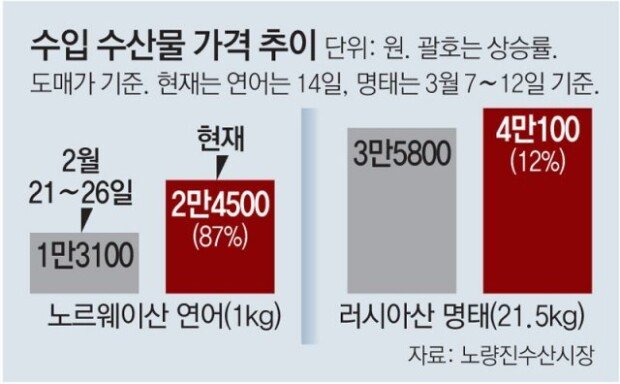Prices of salmon and pollack soar following Russia’s invasion of Ukraine
Prices of salmon and pollack soar following Russia’s invasion of Ukraine
Posted March. 15, 2022 08:01,
Updated March. 15, 2022 08:01

Third week into Russia’s invasion of Ukraine, the prices of imported marine products, including salmon and Pollack, are soaring. Norwegian salmon is mainly transported to South Korea by air via Russia but air fares have become expensive as flights are taking circuitous routes due to Russia’s airspace closure. As for Russian pollack, South Korea is relying on frozen stockpiles due to restrictions on deep-fishing and import payments.
According to Noryangjin Fish Market in Seoul on Monday, the wholesale price of raw Norwegian salmon was 24,500 won per kilogram, up 87 percent from 13,100 won three weeks ago. During the same period, a wholesaler that directly imports Norwegian raw salmon raised the price of raw salmon fillet it supplies to restaurants by 13,000 won per kilogram.
Super supermarkets have raised prices as well. E-mart raised the price of Norwegian raw salmon (100g) by 15 percent from 3,880 won last week to 4,480 won and Lotte Mart raised the price by 26% from 3,780 won to 4,780 won. Homeplus is planning to raise the price by 7.7 percent from 3,890 won to 4,190 won. A surge in logistics costs caused by flight detours are among the reasons behind the price hike.
The price of pollack, fish often served on dinner table here in Korea, is also increasing. According to Korea Agro-Fisheries & Food Trade Corporation (aT), the retail price of a frozen pollack was 2,655 won on Monday, up 12.9 percent from 2,351 won on Feb. 24, the day when Russia invaded Ukraine. More than 60 percent of pollack distributed in the country is from Russia. The wholesale price of Russian frozen Pollack has also risen a whopping 12 percent for the past two weeks.
Most school lunch providers and food companies say there will not be an immediate impact since salmon and pollack are stockpiled for three to six months. But if the situation continues until the second half of the year, importers will inevitably have to resort to expensive American pollack, causing food prices to soar.
Dong-Jin Shin shine@donga.com







